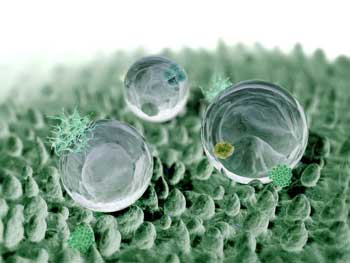
Nanotechnology will soon be used in almost every arena
The big debates about technologically enhanced food usually surround the use of genetic modification, but most of us aren’t as familiar with the concept of nanofood. Which is unfortunate and needs to be quickly rectified, because within the next few years we are about to see a huge boom in its commercial availability on store shelves.
Now, this doesn’t necessarily mean that the food is modified on a molecular level (at least not yet, but they’re working on it!) – but rather that “nanotechnology techniques or tools are used during cultivation, production, processing, or packaging of the food” (definition from Nanoforum).
So what does this mean exactly? Well, the most practical applications are in changes to the way that food is packaged and distributed. Nanotechnology can be used in such instances to ensure longer freshness, to change colour when the food inside has gone off, or even to repair broken packaging on the spot.
Agriculturally, the addition of nanosensors into the farming process will allow for far greater information about everything from the nutrient and water levels of soil, to the presence of pests and disease. Animals can have nanochips implanted that provide vaccines and disease treatments when needed. Foods can have nanocapsules embedded within them to add additional nutritional value or taste. There are an almost infinite number of applications for this technology, and in the more distant future we will see products available where we can choose which flavours we wish to experience and which nutrients we need to ingest.
All of this might sound initially like a Utopian food revolution. However, at the moment the technology is still an unknown quantity when human health and effect is concerned – particularly in the long term. There are currently few regulations that refer to the use of nanotechnology at any point in the food production and distribution process – and there is a growing call for concern about possible health implications of their use. Nanotechnology is capable of entering our bodies at a cellular level, and the fact that companies are designing and preparing to implement such products well before adequate testing has been conducted is alarming at best – and surely criminally negligent at worst.
[ad name=”Google Adsense-PostSquare”]
Considering the consumer backlash against GM foods, particularly in Western countries, it is difficult to see how nanotechnology that impacts the food substances themselves will catch on in the short term. However, I can easily see that people will readily accept nanotechnology utilised in food packaging – which may in the end prove to be a very beneficial technology that helps solve the problem of the vast amounts of food wasted daily. The point being however, that we really should take the time to assess these products and not rush them to market in order to beat competitors and make money.
There is another issue at hand here, and that is do we really need to adapt our daily foods with such technologies at all? Whereas nanotechnology could lead to some fantastic benefits in other fields such as engineering or medicine, is there truly a need for us to incorporate them into our supermarkets? We should rather consider adapting our consumer habits to help combat issues such as food wastage and long distance product sourcing. Is there a point where such progress no longer becomes progress, but rather a search for greater novelty or profit? Do we really need to fulfill our Willy Wonka fantasies of three-meal-chewing-gum?
I can understand some arguments surrounding the use of nanotechnology in agriculture, particularly in areas where such use could lead to relief from starvation and poverty – but even then, we are unaware of any long-term environmental impacts that might occur. The results of which could possibly be devastating for the local communities. Not to mention the problems associated with having corporate ownership of third-world farming techniques, which is an ethical minefield that we have seen present around GM foods.
Time and time again it seems that the greatest ethical concerns surrounding technology come from the corporate need to boost profit-margins. Shortcuts are taken to get products to market, and sometimes warning signs are ignored. There needs to be far tighter and specific regulation created now in regards to the use of nanotechnology, and at the very least we need to ensure that as consumers we must be informed as to when and where nanotechnology is utilised within our food or, for that matter, anywhere else. We must be given an open and clear choice, rather than having such products forced upon us unknowingly.
We will certainly be following nanotechnology in all of its uses closely here at Future Conscience, as it is a rapidly growing field the implications of which must be more openly explored. Let us know what you think about nanofood technology – good or bad?
[ad name=”Google Adsense-Link Banner x4″]




